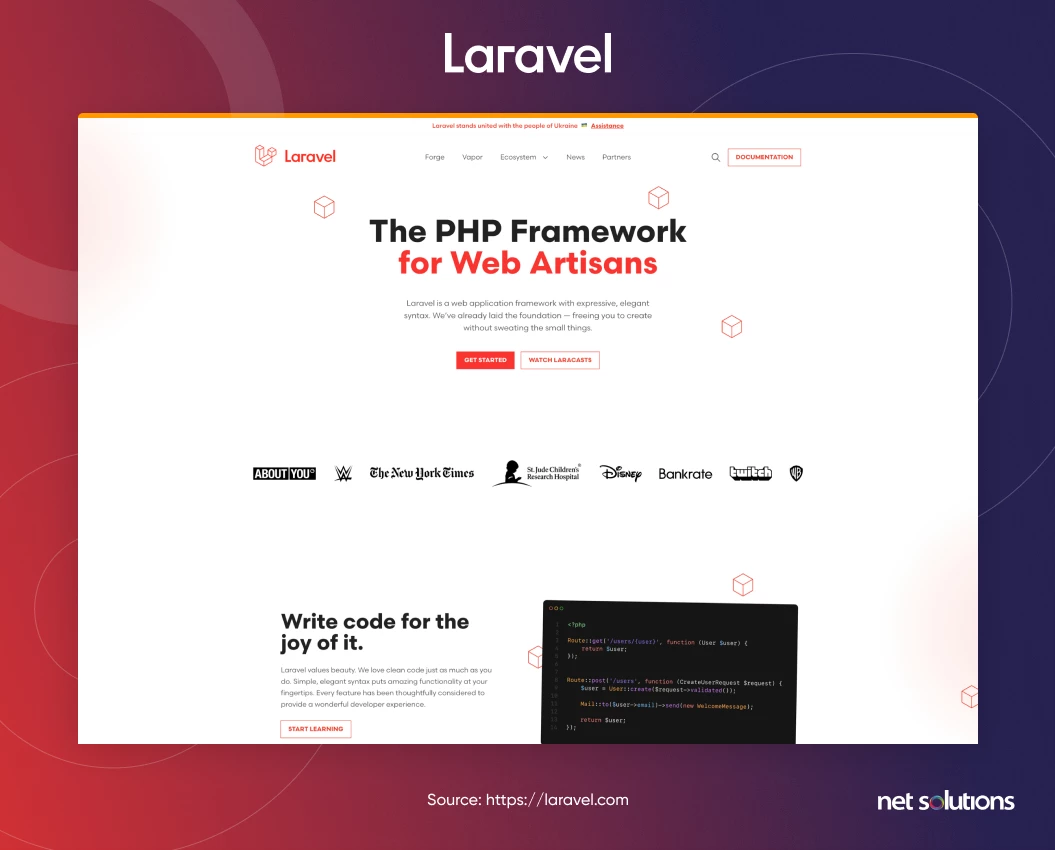
“The PHP Framework for Web Artisans” – Laravel.com
What is Laravel? Laravel is a web app development framework with expressive and elegant syntax that makes the entire web development process faster, easier, and enjoyable for developers by eliminating all the pain points associated with handling complex PHP code.
Laravel framework was created by Taylor Otwell with the sole intention to help website developers make complex coding simple, faster, and better. Laravel was based upon Symfony components, but Laravel eases some of the commonly executed tasks like routing, authentication, sessions, caching, and others so that developers can focus on building business-related features of the app.
“Did someone say rapid? Laravel delivers elegant applications at warp speed.” – Manish Garg, Engagement Project Manager at Net Solutions
Is Laravel Frontend or Backend?
To answer the question of “Is Laravel frontend or backend?” can be answered simply as “backend.” For a longer explanation, Laravel is, as noted above, a PHP framework that sits server-side. Using Laravel, you can develop full-stack web applications, meaning it has capabilities to support both frontend and backend work.
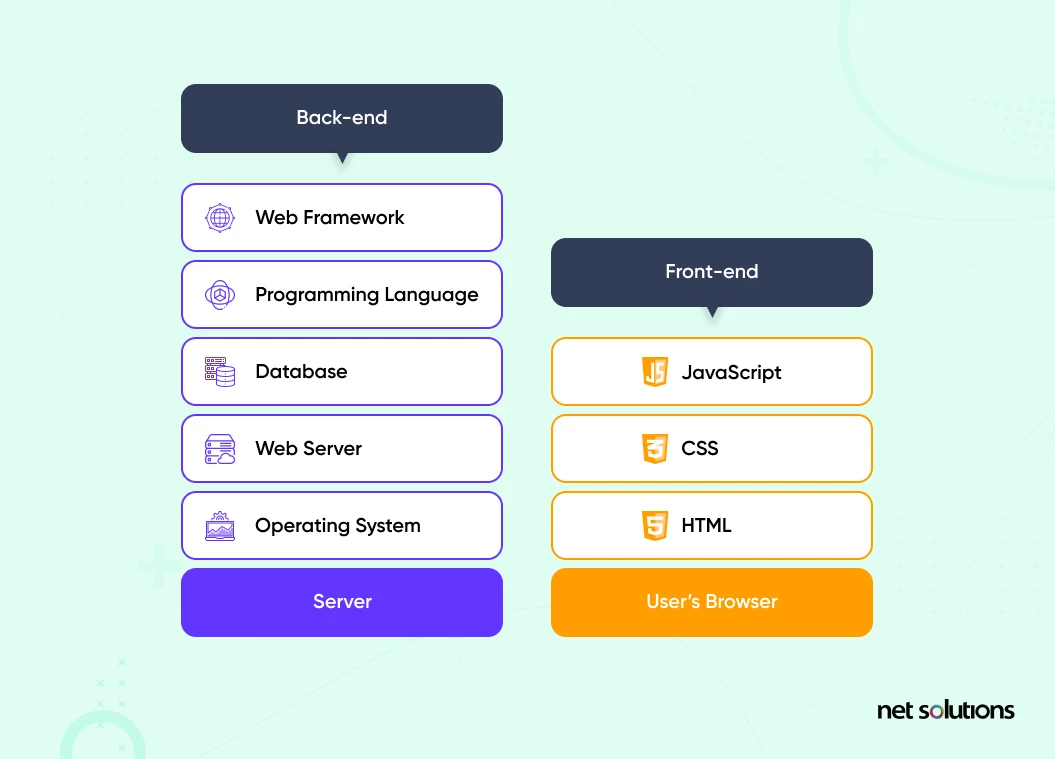
Top 5 Laravel Framework Features that Make it Popular
PHP frameworks’ market is a bit crowded because of several competitors fighting for the limelight and attention. However, the robust Laravel features list is something that makes it stand out.
1. Blade Template Engine
Laravel comes equipped with the Blade template engine, which is simple but very powerful compared to other PHP templating engines. It adds zero overhead to your web app and doesn’t restrict you from using plain PHP code in views. Along with some convenient shortcuts for general PHP functions, it also provides features like template inheritance and displaying data that add flexibility to the web development process.
2. Eloquent ORM
Eloquent ORM in Laravel provides web developers with a simple ActiveRecord implementation that makes their interaction with databases easy and less time-consuming. It lets them write database queries using PHP syntax, and they don’t need to write or know SQL for updating or modifying databases.
3. Laravel MVC Architecture
Laravel is an MVC-based PHP framework that ensures a tight separation between presentation layers and business logic. MVC stands for Model, View, and Controller. It is a design pattern that separates the model (logic, data handling), view (UI), and controller processes (interface).
Being based on MVC, the Laravel framework provides many features like high performance, increased security, and scalability.
4. Open Source and Wide Community
Though many PHP frameworks come with a price tag, Laravel is an open-source framework for web developers. Also, it has a powerful community that supports the framework to make it more advanced and flexible.
5. Object-Oriented Libraries
Laravel PHP framework is packed with many built-in object-oriented libraries that are full of amazing features for developers.
Along with these fantastic Laravel framework features, various reasons make organizations ready to go ahead with Laravel development services. These very reasons, or rather the benefits of the Laravel Framework, are listed below.
Why Use Laravel Framework for Web Development?
A number of people ask why is Laravel the best framework and so popular among developers? The only answer to it is because they like the peace of mind while developing web apps, and Laravel provides much more than that. No doubt, its ease-of-use, and quality have helped it gain immense popularity but using this popular framework also paves the way for many other benefits.
Issues with other PHP frameworks have been well spotted, resolved, and incredibly well-tested in the development of Laravel. When it comes to testing, note that the PHP Laravel framework has integrated testing into it, making sure your web application is bug-free.
Here are some advantages of using Laravel that will make your web development a seamless and efficient experience:
1. Laravel Development Means Faster Time-To-Market
For easing common tasks, the PHP framework Laravel works on a modular basis. It implies that with Laravel, there are a lot of pre-built functions and structures that work on the latest PHP principles to build responsive web applications in a time-efficient manner. Since it is an open-source framework, developers have been in the process of improving these resources since the birth of Laravel in 2011.
This speeds up the development process of web applications, making Laravel quick and intuitive. With the Laravel framework, there is no need to spend long hours and weeks writing individual lines of code. Therefore, it speeds up application delivery while also proving to be economical.
2. Better Authentication and Authorization Option
Wikipedia says, “Taylor Otwell created Laravel as an attempt to provide a more advanced alternative to the Codelgniter framework, which did not provide certain features such as built-in support for user authentication and authorization.”
Laravel framework makes it extremely simple and easy to implement a complete authentication system — Login, Registration, and Password Reset. You will be surprised to witness that Laravel does all this with the help of a single command. It also provides a simple way to organize authorization logic and control access to resources.
VOYlegal’s Laravel Journey with Net Solutions
One of our clients, VOYlegal, a recruitment firm for lawyers, needed a job portal that could help lawyers and employers seek and post jobs respectively.
Initially, the whole architecture of the website was built using CakePHP. Because of the Laravel framework’s various benefits, like a simple way to organize authorization logic and control access to resources, we migrated the VOYlegal website from CakePHP to Laravel.
3. Stay Away from Technical Vulnerabilities with Laravel Framework
What goes in tandem with the web development process is ‘Security Vulnerabilities.’ A study by OWASP Foundation describes SQL injection, cross-site request forgery, cross-site scripting, etc. as the most critical web application security vulnerabilities.
The cost and time to fix these vulnerabilities increase exponentially as you progress through the software development lifecycle (SDLC). The following graph indicates the cost increase with the inculcation of security vulnerabilities.
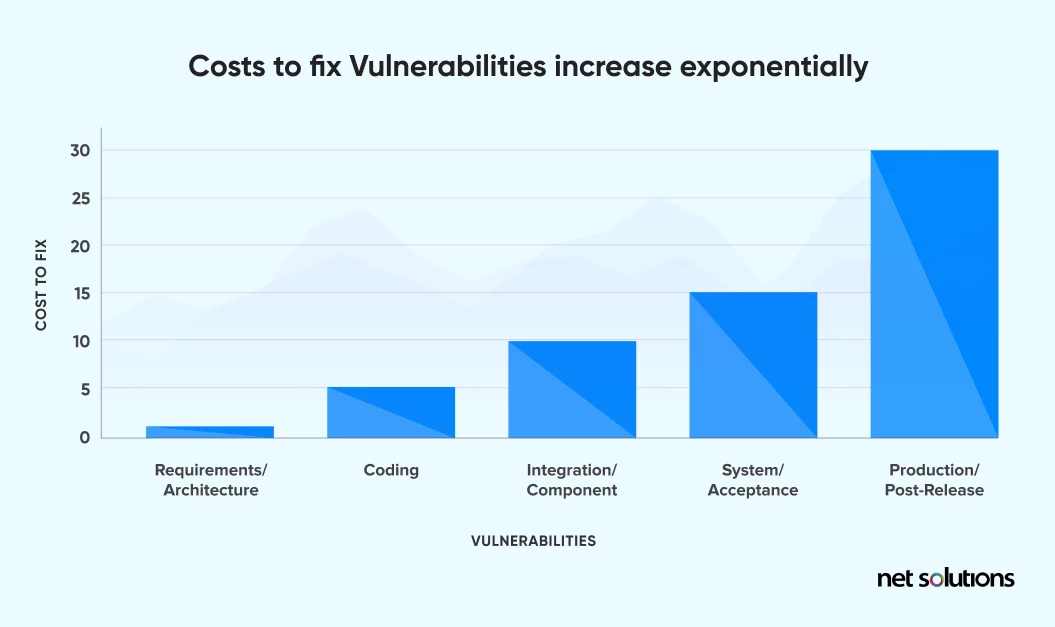
According to the graph, it is 30x times more expensive to eliminate vulnerabilities during the post-production phase than during the design, requirement identification, and architecture stage.
And when it comes to security, there is none other than Laravel that can secure your web application by protecting it against the most severe security risks: SQL injection, cross-site request forgery, and cross-site scripting.
So, why use Laravel Framework? Because it is super-secure and does not allow any malware activities or security threats to enter the web app. This simply implies that your PHP web app is completely secure with Laravel.
4. MVC Architecture of Laravel Framework
Laravel architecture is MVC-based, and this is something that makes Laravel the best PHP framework for website development.
MVC architecture comes up with built-in functionalities that developers can use at their best while building your web app. Apart from this, MVC architecture provides better documentation, improved performance, and multiple built-in functionalities compared to other PHP frameworks.
Here’s how the Laravel MVC works.
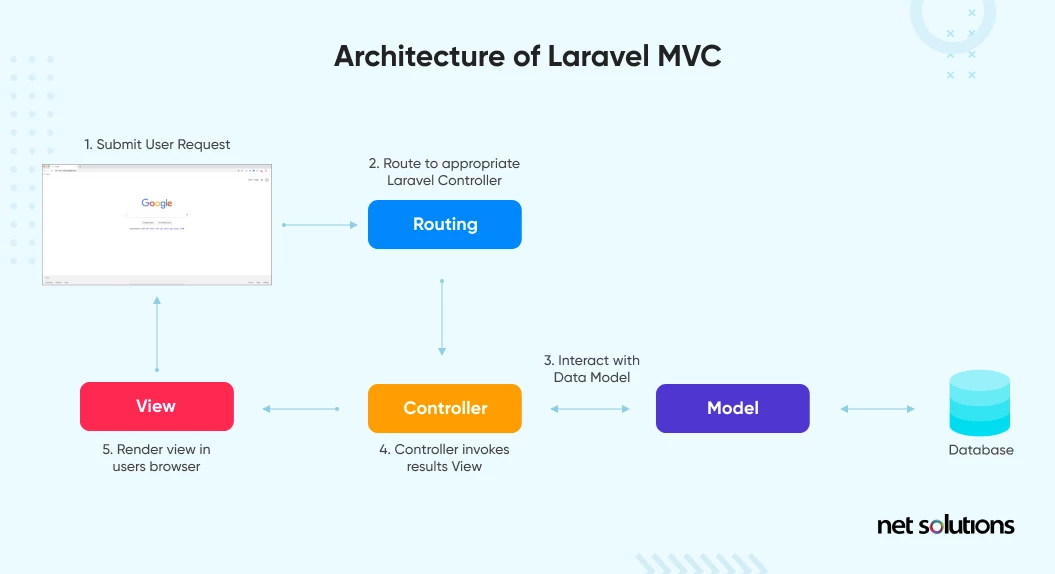
5. Automated and Unit Testing Feature
One of the significant advantages of the Laravel Framework is its extraordinary testing support. Without testing a web app thoroughly, you can not ensure that it’s bug-free and in accordance with the initial requirements alone.
To make sure that your web app performs well, the Laravel framework provides automation testing support, making it less time-consuming to test an app. It offers simple ways for imitating users’ basic behavior (For example, making requests, analyzing outputs, clicking forms) that help you do expressive testing of your app.
The unit testing feature of the PHP Laravel framework lets you test each component or module of your app to ensure that the integrated application performs well when all the modules add up. This results in high-performing web apps with optimized web code.
6. Automated Task Execution and Scheduling
Every web application needs a task scheduling mechanism to automate tasks when it is necessary. For example, sending emails to subscribers, notifications to app users, or only cleanup of the database to make web apps faster.
In the past, web developers used to generate a Cron entry for each task they wanted to schedule. However, with Laravel, you can avoid this headache by using its automatic command scheduler. It allows you to quickly and expressively define your command schedule within the Laravel framework itself, and a single Cron entry is required on your server to execute the task.
Besides making your web app high-performing and faster, this feature of the Laravel framework also helps you save on the hosting cost.
7. Traffic Handling
Handling application traffic becomes challenging as its popularity grows.
The present situation is like this: the more the traffic a web app fetches, the more are the request numbers it should deal with each second. It means that the web application’s hosting will come under an expensive price tag or even the website server will stop functioning with data loss.
You must definitely not want to see yourself in such a situation.
PHP Laravel Framework supports a message queue system for load balancing. The system helps maintain a healthy web server along with effective traffic management. Thus, it keeps a web server healthy – one of the many Laravel benefits.
The Laravel queue service provides a unified API across a variety of different queue backends. Queues allow you to defer the processing of a time-consuming task, such as sending an email, which drastically speeds up web requests to your application.
Is Laravel the Best PHP Framework?
Selecting the right PHP framework for developing a web application is one of the most critical decisions and depends on many factors. The best PHP framework for you is the one that satisfies your needs and aligns with your business requirements. The general factors that you should look for while choosing a framework for your web app include:
- The popularity of the framework
- Database access
- Third-party integrations
- Performance support
- Modularity
- Built-in modules
- Cost of development
- Testing features
- Community Support
- Security
Before the birth of Laravel, the Codeigniter framework was the most popular PHP framework. But, it lacked some essential features like built-in user authentication and authorization. As a result, Laravel was born, and to date, it is considered the best PHP framework for developing beautiful web experiences.
Though Laravel shines at the top in the list of best PHP frameworks and provides all the features mentioned above, Laravel vs Codeigniter is still a matter of debate among many web developers.
Here’s a comparison table to help you differentiate between the two:
Laravel vs Codeigniter
Given the current popularity of PHP frameworks and trends which shift over time, questions arise such as “Which is better: Laravel or Codeigniter?”
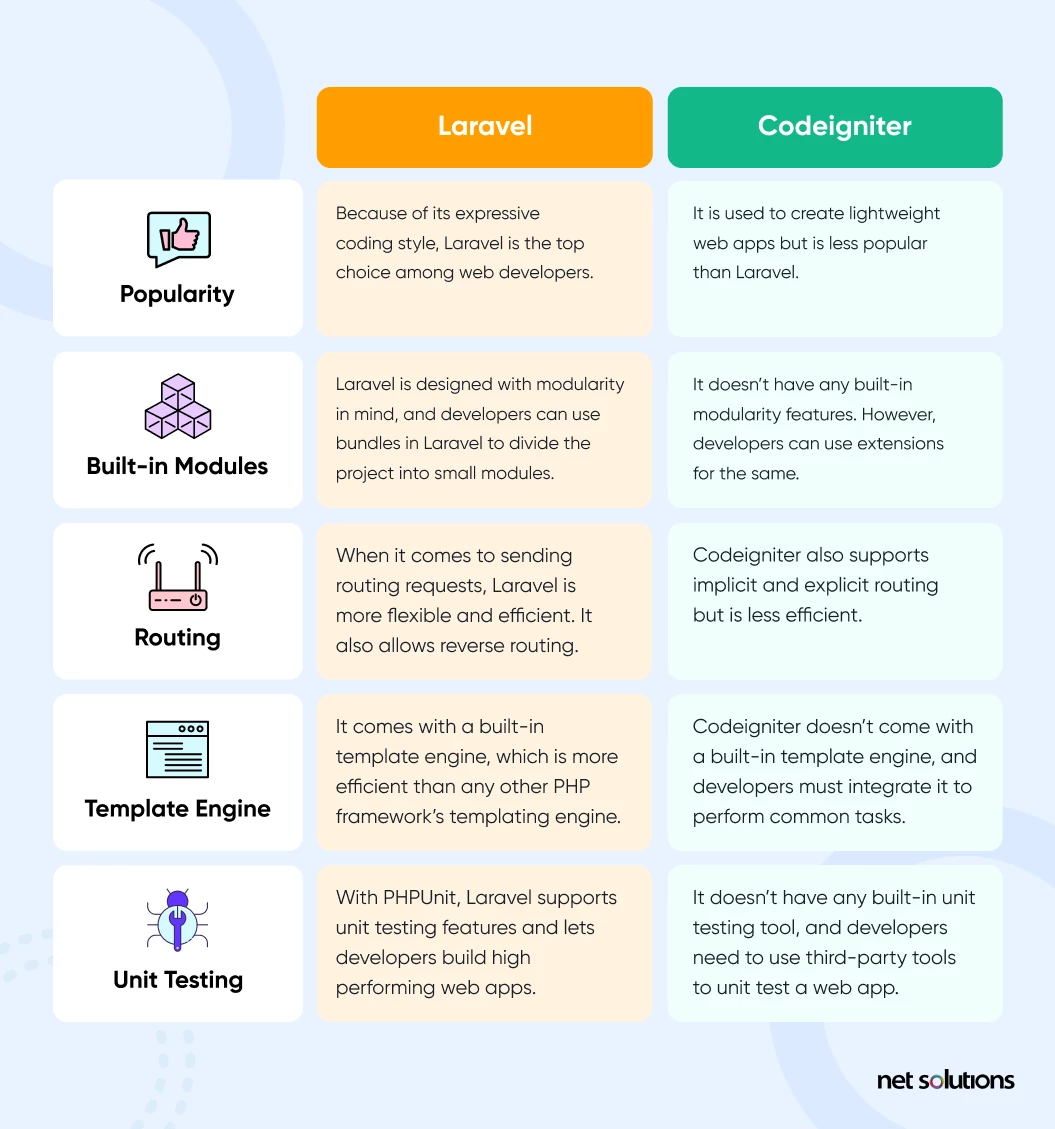
Looking at the table, it is clear that Laravel provides many such features that Codeigniter doesn’t possess. But, Laravel also has some disadvantages and is certainly not the best fit for every web application.
It is a lightweight framework and offers less in-built support than Ruby on Rails and Django (a web framework based on Python). While you can solve this problem by integrating third-party tools, the process of doing the same can turn tedious for large-scale websites. As with any project development tech stack decision, analyze your business needs and then choose the best PHP framework for your web app development.
Laravel Advantages and Disadvantages
Advantages
- Easy to get started thanks to great documentation and community support and an intuitive interface
- The syntax is easy to understand and use, making it easy even for beginners to use
- Built-in libraries
- Easy to deploy to major cloud service providers such as AWS
- Powerful Blade Templating Engine
- Comes with security and authorization out-of-the-box
- Robust and scalable
Disadvantages
- Slower than some frameworks
- Less built-in support
- Has basic security features, but is still limited by the inherent insecurities of PHP
Frequently Asked Questions
1. Is Laravel safer than PHP?
Laravel provides added security to core PHP through libraries, providing vetted and secure code at the ready, and providing additional security features such as an authentication system, tokens to prevent third-party attacks, and protections against cross-site scripting SQL injections. Many of these security protections are provided by Laravel, whereas in PHP developers must build their own security rules and systems.
2. How to make secure Laravel website authentication?
Authentication is one of the core areas that Laravel tries to improve security with an out-of-the-box solution available at app/config/auth.php. Laravel provides options for hashing and encrypting passwords, authenticating users, forcing password resets and security minimums, and several other important rules that provide strong access control.
3. Is Laravel good for big projects?
Laravel is ideal for websites, eCommerce sites, web applications, content management systems, and more. However, while Laravel is ideally suited to complex apps due to its queue system to aid in processing, it can be slower than some other frameworks and is not ideal for all large websites as it may require more third-party tools for advanced functionality (less in-built assistance). But ultimately the choice comes down to the project and the availability of IT skills in Laravel to maintain the project over time.









No comments:
Post a Comment